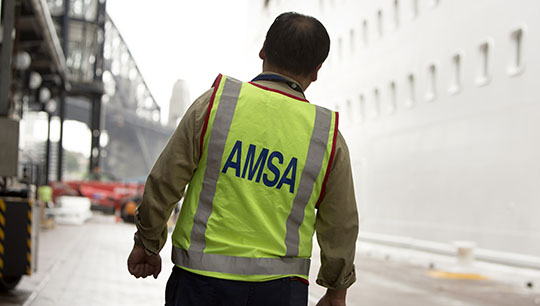
Australia is enforcing a maximum continuous period that a seafarer can serve onboard a vessel without taking leave, which could see ships prevented from departing Australian ports if crew have spent too long at sea.
The move, which came into force on 1 July 2020, will target ships where seafarers are working beyond their original contract lengths during the Covid-19 pandemic.
The Australian Maritime Safety Authority (AMSA) has issued notice that, until 1 October 2020, no seafarer can work at sea beyond 13 months without a rest. AMSA has urged all ship owners and managers to comply with the guidelines as enforced by the Australian port state authorities.
The protocol, which seeks to apply the Maritime Labour Convention, 2006 (MLC, 2006) requirements on continuous maximum working periods at sea and allows for the two additional months agreed by ITF at the start of the pandemic, is good news for the thousands of seafarers stuck onboard.
In June, Nautilus International called for action to end the 'inhumane' extension of seafarer contracts, after the Panama Ship Registry announced that they can now be extended by a further three months and up to 17 months where crew change is not possible due to the outbreak of the Covid-19.
Australia's new guidelines will be enforced where:
- A seafarer has a valid Seafarers Employment Agreement (SEA) and has served continuously on board a vessel for more than 11 months, and less than 13 months without taking leave, the master will be required to provide a plan for the seafarer's repatriation which is approved by the flag state, and results in the repatriation of the seafarer before they have served a maximum continuous period of 14 months.
- A seafarer has a valid Seafarer Employment Agreement (SEA) and has continuously served on board a vessel for more than 13 months, the vessel will be prohibited from departing port until AMSA is provided with a plan for the seafarer's repatriation which is approved by the flag State and results in the repatriation of the seafarer before they have served a maximum continuous period of 14 months.
Tags
More articles
Governments must bring in exemptions for seafarers
The International Transport Workers’ Federation (ITF) has called on the world’s governments to act swiftly to give seafarers visa, border and quarantine exemptions in order to make crew changes possible and resolve the present crisis.
High-level ministerial meeting calls for international protocols on crew changes
The UK is leading a coalition of 15 countries calling for the creation of international protocols to facilitate shipping operations and the immediate safe resumption of seafarer crew changes globally.
European leaders urged to make real difference in global crew change crisis
International and European maritime industry stakeholders have further urged European leaders to resolve the ongoing crew change crisis in a series of communiqués to senior figures in the European Commission and European Parliament.
Philippines takes action on pandemic crew relief and repatriation
The Philippines has become the latest nation to introduce a 'green lane' system to allow seafarers to leave and join their vessels while pandemic travel restrictions are in force.
UK MCA to begin 'phased return' to vessel inspections
The resumption of routine vessel inspections is a partial relaxing of the restrictions put in place in March this year, in response to the Covid-19 pandemic.
